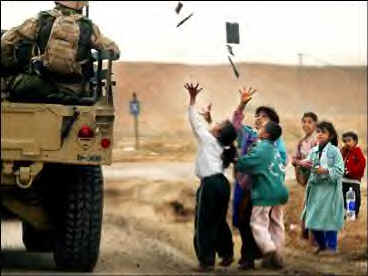

The Stuff They Don't Give Medals For
By Tim Watts
Danny was a tough, street-smart kid from New York City. I knew him as well as anyone in our infantry platoon in Vietnam and liked him a little better than most. Danny didn't make a lot of friends. He operated solely on two principles. One was: Get them before they get you. The second was: Me first.
Danny was out for Number One, and he didn't care who knew it. He took strange pride in announcing to every replacement who came into our unit, "Listen, rookie, I'm a short-timer, and I'm going back to the world in one piece no matter what happens to the rest of you. So just don't get in my way. Understand?"
The newcomer probably did not understand that "the world" meant home, and "short-timer" meant someone who was close to going there. Yet already this guy was telling him that he didn't care if the kid lived or died as long as he stayed out of Danny's way.
Around the Tet holiday in 1968, we were on a mission outside Dong Ha when we saw a little village to our right near the tree line. It was standard operating procedure to search any settlement we encountered. We lined up about five yards apart and swept toward it like a huge, olive-drab push broom, sending everything from animals to rice-paddy workers scattering.
When we reached the edge of the village, our platoon began its move into the random collection of wood huts with their thatched roofs, dirt floors and doorways full of wide-eyed children hiding behind their mothers. There were no men, just the worn-looking women and the curious children.
The sharp crack of shots sounded foreign at first, like they didn't belong in this place of mothers and children. But the shots were real. Reflexes took over, and I found myself on the ground crawling for protection.
My heart was pounding when I reached a tree, but I wasn't the only one who had sought this refuge. Entrenched behind the broad trunk was "me first" Danny.
When I could raise my head to look around, I found the village empty. Soldiers, women and children had all taken what safety they could find. I heard our people shooting about snipers in the tree line, and at intervals the distinctive crack of Soviet-made AK-47s was answered with the roar of our M-16s.
I glanced at Danny and saw him staring at something a few yards in front of our tree. I followed his line of sight, and that's when I spotted her.
She was strikingly small there on the ground. She couldn't have been much more than five or six. I could see that she was crying and terrified. I could also see a small red stain on her shirtsleeve.
At that moment, out of the corner of my eye, I saw Danny leave the protection of our tree and run, crouching low, toward the Vietnamese girl. The rest all seemed to happen at the same instant. Danny reached the girl, took hold of her clothing and, half crawling and half running, began dragging her back toward the tree. I could hear somebody yelling for Danny to get out of the open; then came the snap of enemy fire.
I saw a muzzle flash in the trees and emptied my clip in that direction. But it was too late. Danny was down. Still, he'd managed to push the fragile child close enough for me to reach out and yank her to safety. The others in our platoon began pouring round upon round into the tree line. The snipers, knowing the game was up, fell silent.
I grabbed Danny and hauled him back to the tree; the medic was there when I turned around. He pulled off Danny's flak vest and began trying to patch him up.
I held the child close to me. Her eyes were red from crying, and tears had made muddy paths down her cheeks. As I examined her arm, where a bullet had grazed her, she didn't cry out. She just kept staring at Danny. The girl seemed to realize she had no words he could understand. Finally, she reached out and gently touched the leg of his fatigue pants. Then she ran into one of the huts.
I heard later that Danny, too, was going to be all right. But he was hit bad enough to get his wish -- they were sending him back to the world. Our platoon leader gave us all a long lecture about how a soldier's duty to keep himself safe far outweighs any need to help a civilian.
He said, "This is the stuff they don't give medals for."
I imagine he was right, but I do know that in that village one tough kid from New York found out he was much more of a man than he ever thought he could be. And somewhere there's a Vietnamese girl, now in her thirties, who remembers that an American soldier risked everything to save her life. All in all, not a bad exchange for a medal.
Previous Story Back to Calendar Next Story